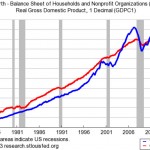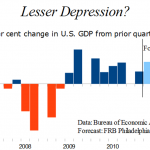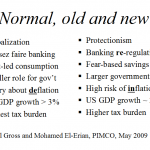Things on my mind as I prepare for the business/economy segment on KUOW‘s Weekday program at about 10:40 a.m. Pacific time May 29: 1. The Boeing Boom? So over. The headlines over the past several weeks about layoffs and other cutbacks at Boeing (excellent coverage in the Seattle Times by [continue reading . . . ]

A correspondent who heard me last week on KUOW‘s Weekday program asks if there is research on “a correlation between the wealth lost in a downturn and the length of following recovery.” I told him the book to read is This Time Is Different: Eight Centuries of Financial Folly By Carmen [continue reading . . . ]
Martin Wolf, much-honored chief economics commentator of the Financial Times, has been my beacon during the financial crisis. So it is especially discouraging to read his June 6, 2012, column, headlined “Panic has become all too rational”. Wolf argues that the advanced economies are caught in a “contained depression,” that [continue reading . . . ]
The term “Lesser Depression” looks more appropriate by the hour. Harvard’s Kenneth Rogoff suggests another label, the Second Great Contraction (to distinguish it from the Great Depression). I’ve quoted him in Food for Thought. See his excellent essay on the op-ed of the Financial Times* on Aug. 9, 2011 The [continue reading . . . ]
The bad news is that the United States – indeed, much of the developed world – is in the midst of a “contained depression.” The private sector continues to de-leverage. Unemployment remains high. Pay for most is static or declining. Deflation remains a bigger threat than inflation. Depressions eventually end, [continue reading . . . ]

What to call the period that arguably began in 2006 when the rich world’s housing market peaked? The Financial Times (FT) in a Lex column May 13 uses a term I have not seen before: “Lesser Depression.” The U.S. economy typically rebounds strongly following a recession. The 1974-75 and 1981-82 [continue reading . . . ]

Mohamed El-Erian and Bill Gross of Pacific Investment Management Company (Pimco), the world’s largest fixed-income manager, to the best of my knowledge originated the phrase “new normal” to indicate that things fundamentally changed following the Panic of September 2008 and its aftermath. After studying a number of their writings, freely [continue reading . . . ]
As reported in today’s New York Times, convicted Florida mortgage fraudster Lee Farkas related this anecdote about doing business with his commercial banker, Catherine Kissick of Colonial Bank: “One day she was at the McDonald’s drive-in, and I asked her for a hundred — which meant a hundred million — more, [continue reading . . . ]